Abstract
Tolerization of B10.RIII mice (H-2r) with intravenously injected type II collagen (CII) renders the animals resistant to induction of collagen-induced arthritis (CIA). In order to clarify H-2r-restricted T-cell responses that modulate CIA, we have analysed the T-cell proliferative response of B10.RIII mice against cyanogen bromide (CB) peptides of CII, and detected the strongest response to alpha 1(II)-CB10 (CII 552-897). A panel of chemically synthesized overlapping peptide homologues was used to deduce the minimum structure of this determinant which was found to be CII 610-618. A 15-residue synthetic peptide flanking this region, CII 607-621, was found to effectively suppress arthritis when administered as a tolerogen. Collectively, these data identify the structural component within alpha 1(II)-CB10 which is capable of inducing tolerance in B10.RIII mice. A similar approach to the treatment of autoimmune arthritis, involving the institution of self-tolerance, has potential applicability to human rheumatoid arthritis.
Full text
PDF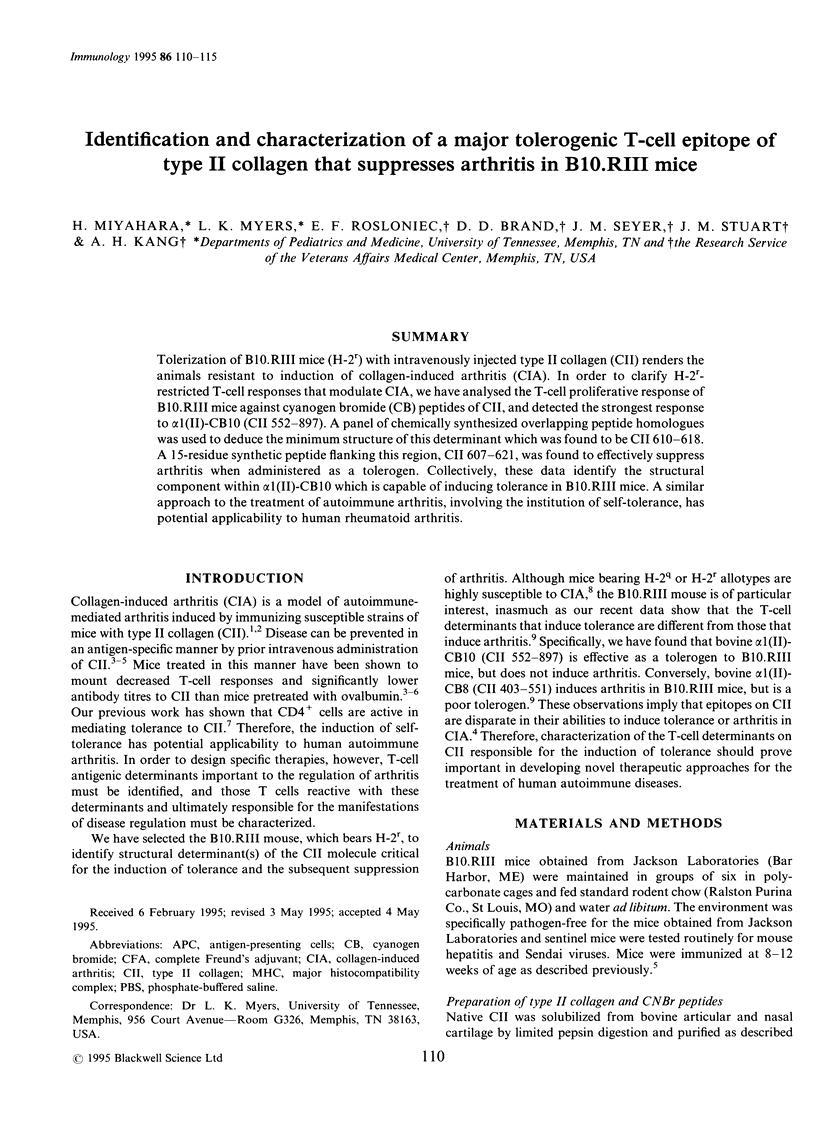
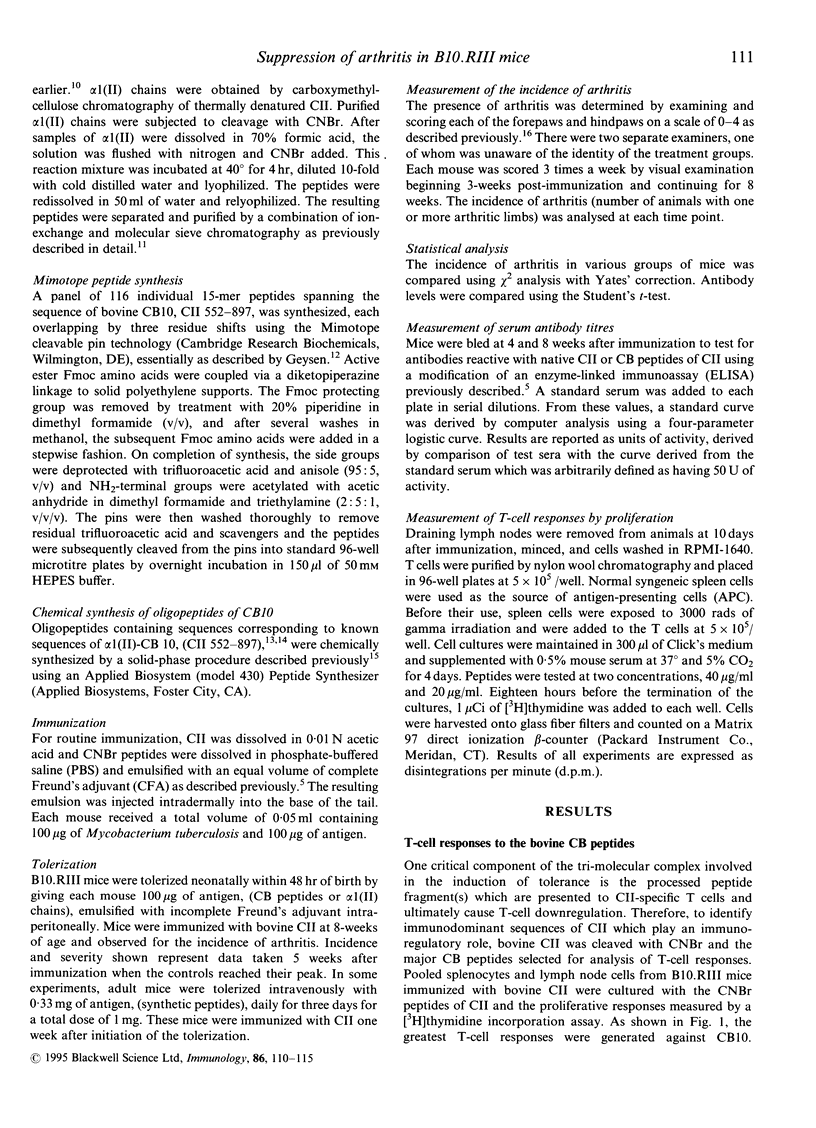
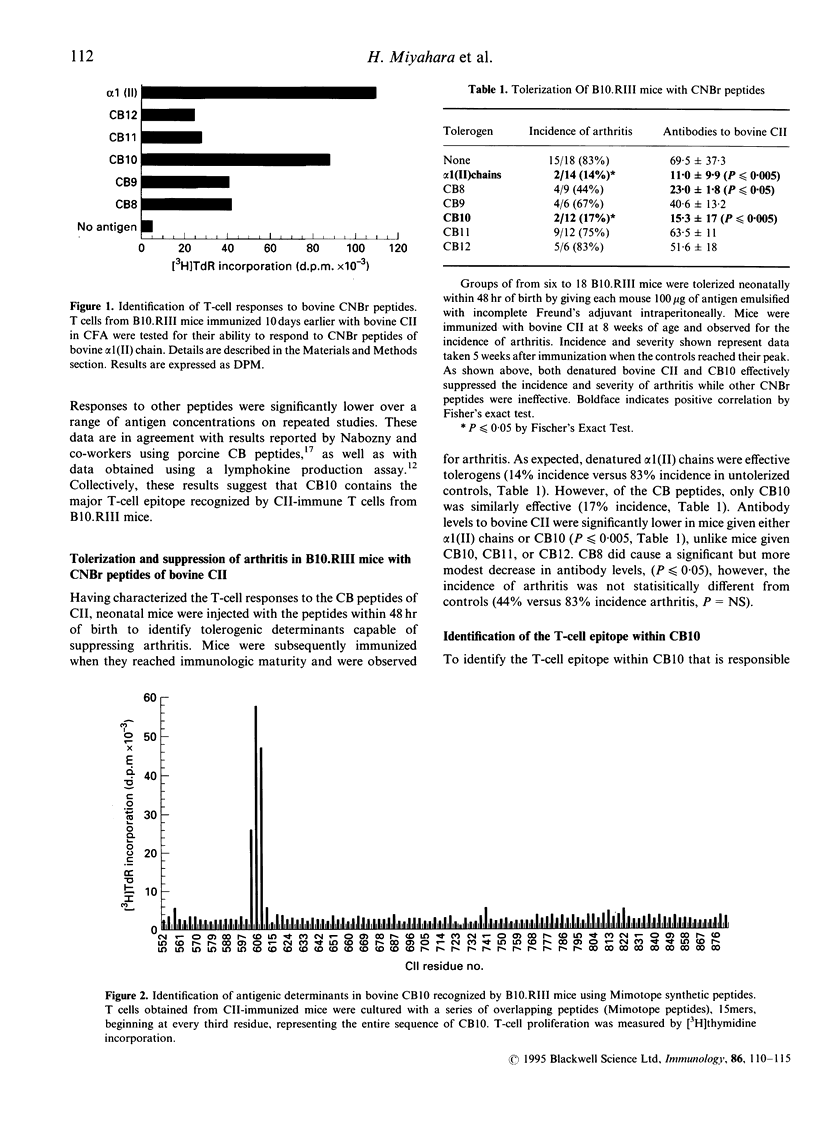
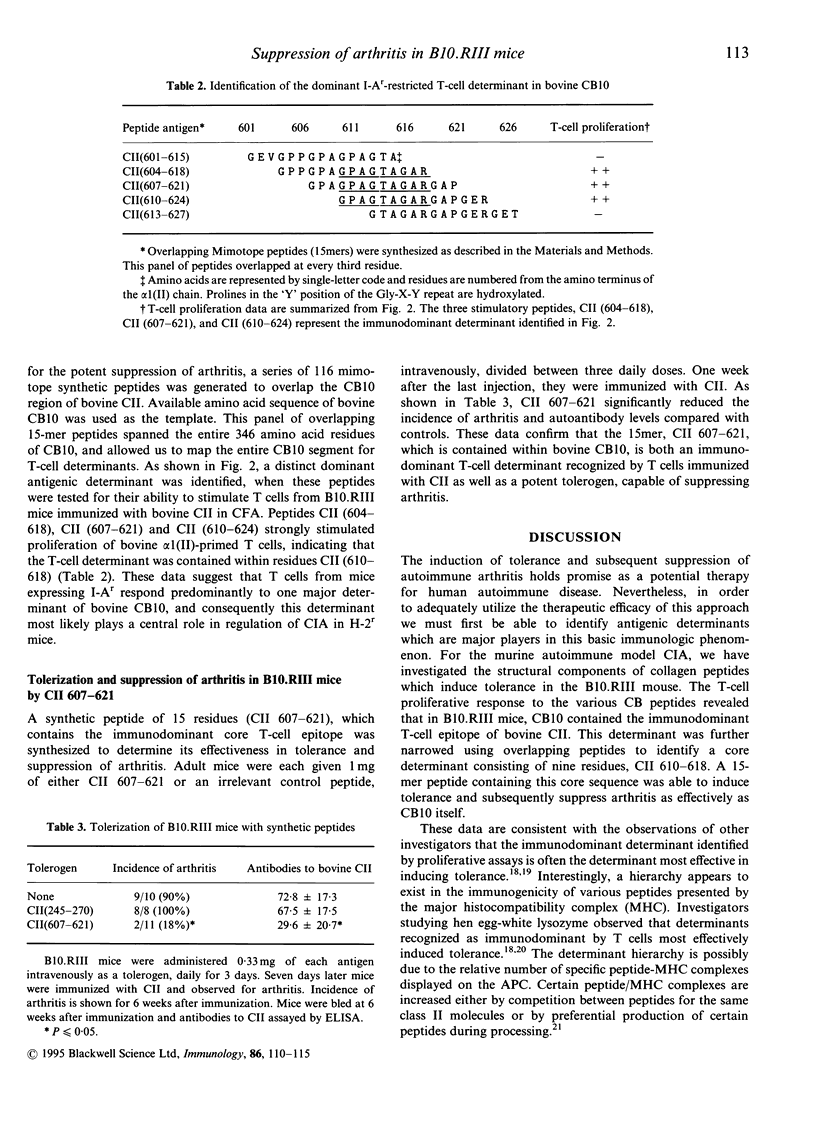
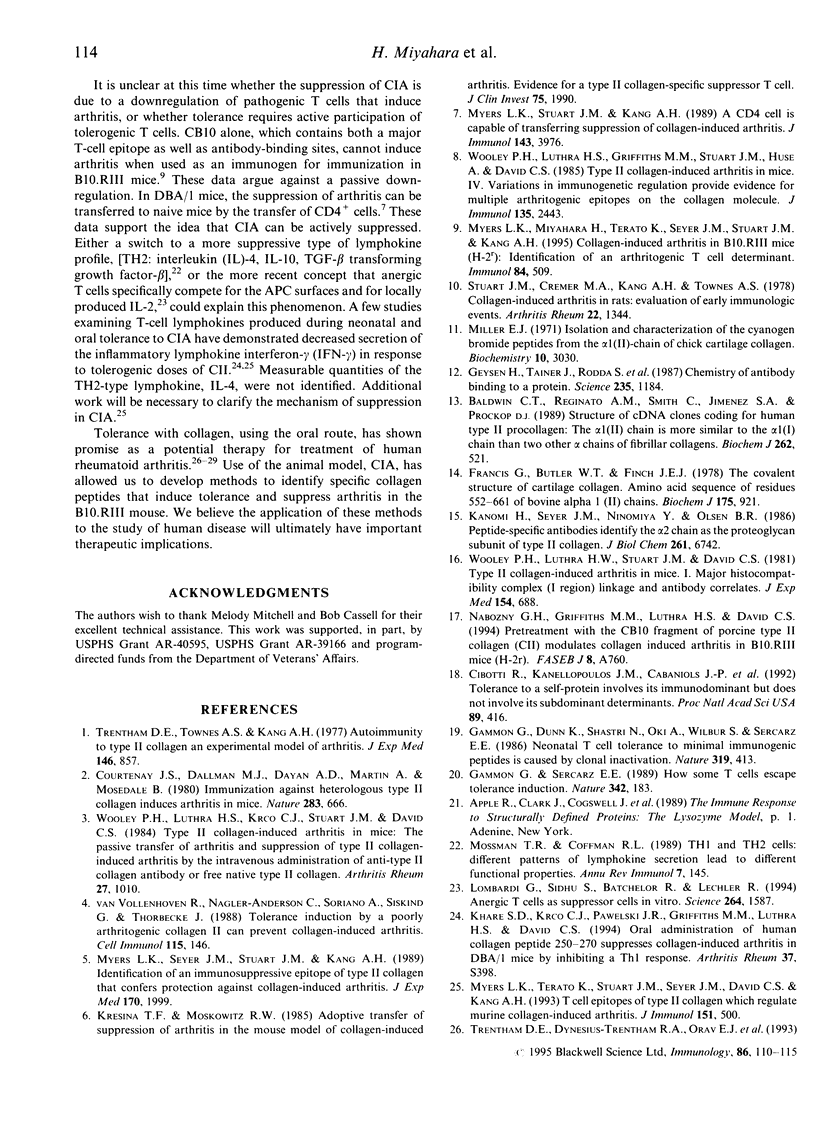
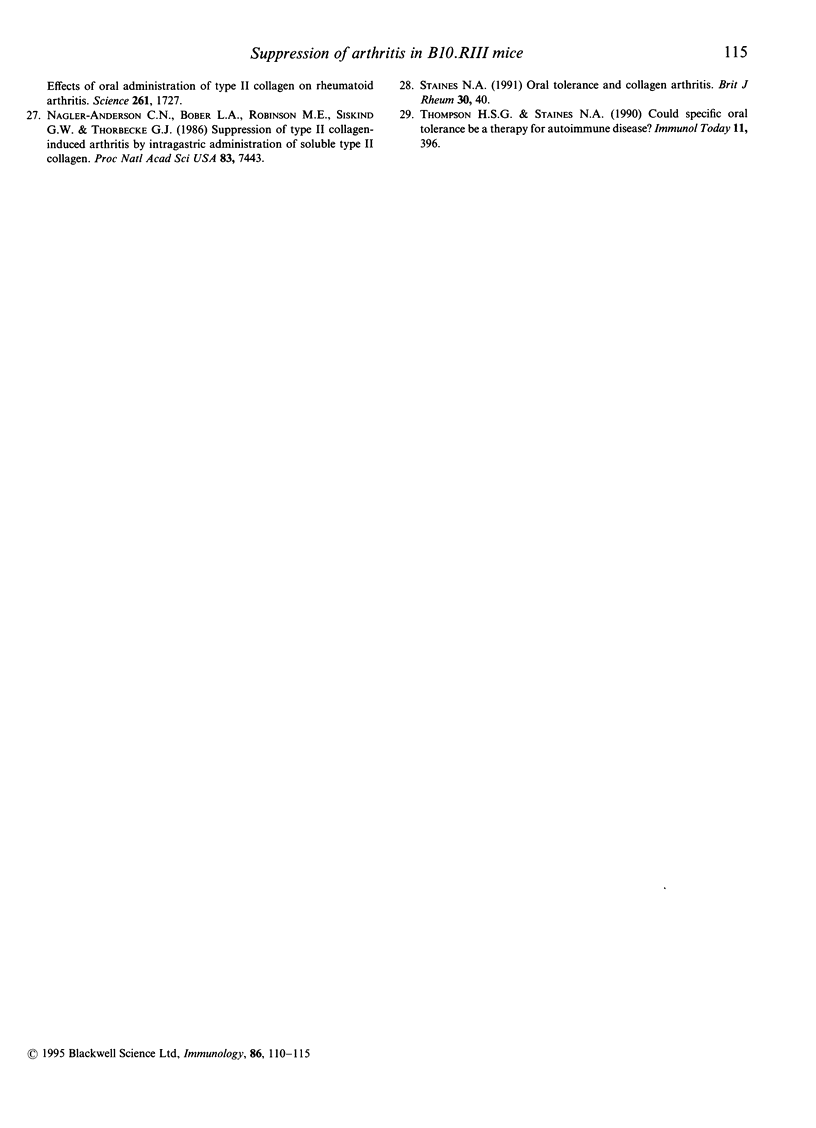
Selected References
These references are in PubMed. This may not be the complete list of references from this article.
- Baldwin C. T., Reginato A. M., Smith C., Jimenez S. A., Prockop D. J. Structure of cDNA clones coding for human type II procollagen. The alpha 1(II) chain is more similar to the alpha 1(I) chain than two other alpha chains of fibrillar collagens. Biochem J. 1989 Sep 1;262(2):521–528. doi: 10.1042/bj2620521. [DOI] [PMC free article] [PubMed] [Google Scholar]
- Cibotti R., Kanellopoulos J. M., Cabaniols J. P., Halle-Panenko O., Kosmatopoulos K., Sercarz E., Kourilsky P. Tolerance to a self-protein involves its immunodominant but does not involve its subdominant determinants. Proc Natl Acad Sci U S A. 1992 Jan 1;89(1):416–420. doi: 10.1073/pnas.89.1.416. [DOI] [PMC free article] [PubMed] [Google Scholar]
- Courtenay J. S., Dallman M. J., Dayan A. D., Martin A., Mosedale B. Immunisation against heterologous type II collagen induces arthritis in mice. Nature. 1980 Feb 14;283(5748):666–668. doi: 10.1038/283666a0. [DOI] [PubMed] [Google Scholar]
- Francis G., Butler W. T., Finch J. E., Jr The covalent structure of cartilage collagen. Amino acid sequence of residues 552-661 of bovine alpha1(II) chains. Biochem J. 1978 Dec 1;175(3):921–930. doi: 10.1042/bj1750921. [DOI] [PMC free article] [PubMed] [Google Scholar]
- Gammon G., Dunn K., Shastri N., Oki A., Wilbur S., Sercarz E. E. Neonatal T-cell tolerance to minimal immunogenic peptides is caused by clonal inactivation. 1986 Jan 30-Feb 5Nature. 319(6052):413–415. doi: 10.1038/319413a0. [DOI] [PubMed] [Google Scholar]
- Gammon G., Sercarz E. How some T cells escape tolerance induction. Nature. 1989 Nov 9;342(6246):183–185. doi: 10.1038/342183a0. [DOI] [PubMed] [Google Scholar]
- Geysen H. M., Tainer J. A., Rodda S. J., Mason T. J., Alexander H., Getzoff E. D., Lerner R. A. Chemistry of antibody binding to a protein. Science. 1987 Mar 6;235(4793):1184–1190. doi: 10.1126/science.3823878. [DOI] [PubMed] [Google Scholar]
- Konomi H., Seyer J. M., Ninomiya Y., Olsen B. R. Peptide-specific antibodies identify the alpha 2 chain as the proteoglycan subunit of type IX collagen. J Biol Chem. 1986 May 25;261(15):6742–6746. [PubMed] [Google Scholar]
- Kresina T. F., Moskowitz R. W. Adoptive transfer of suppression of arthritis in the mouse model of collagen-induced arthritis. Evidence for a type II collagen-specific suppressor T cell. J Clin Invest. 1985 Jun;75(6):1990–1998. doi: 10.1172/JCI111917. [DOI] [PMC free article] [PubMed] [Google Scholar]
- Lombardi G., Sidhu S., Batchelor R., Lechler R. Anergic T cells as suppressor cells in vitro. Science. 1994 Jun 10;264(5165):1587–1589. doi: 10.1126/science.8202711. [DOI] [PubMed] [Google Scholar]
- Miller E. J. Isolation and characterization of the cyanogen bromide peptides from the l(II) chain of chick cartilage collagen. Biochemistry. 1971 Aug 3;10(16):3030–3035. doi: 10.1021/bi00792a007. [DOI] [PubMed] [Google Scholar]
- Mosmann T. R., Coffman R. L. TH1 and TH2 cells: different patterns of lymphokine secretion lead to different functional properties. Annu Rev Immunol. 1989;7:145–173. doi: 10.1146/annurev.iy.07.040189.001045. [DOI] [PubMed] [Google Scholar]
- Myers L. K., Miyahara H., Terato K., Seyer J. M., Stuart J. M., Kang A. H. Collagen-induced arthritis in B10.RIII mice (H-2r): identification of an arthritogenic T-cell determinant. Immunology. 1995 Apr;84(4):509–513. [PMC free article] [PubMed] [Google Scholar]
- Myers L. K., Seyer J. M., Stuart J. M., Terato K., David C. S., Kang A. H. T cell epitopes of type II collagen that regulate murine collagen-induced arthritis. J Immunol. 1993 Jul 1;151(1):500–505. [PubMed] [Google Scholar]
- Myers L. K., Stuart J. M., Kang A. H. A CD4 cell is capable of transferring suppression of collagen-induced arthritis. J Immunol. 1989 Dec 15;143(12):3976–3980. [PubMed] [Google Scholar]
- Myers L. K., Stuart J. M., Seyer J. M., Kang A. H. Identification of an immunosuppressive epitope of type II collagen that confers protection against collagen-induced arthritis. J Exp Med. 1989 Dec 1;170(6):1999–2010. doi: 10.1084/jem.170.6.1999. [DOI] [PMC free article] [PubMed] [Google Scholar]
- Nagler-Anderson C., Bober L. A., Robinson M. E., Siskind G. W., Thorbecke G. J. Suppression of type II collagen-induced arthritis by intragastric administration of soluble type II collagen. Proc Natl Acad Sci U S A. 1986 Oct;83(19):7443–7446. doi: 10.1073/pnas.83.19.7443. [DOI] [PMC free article] [PubMed] [Google Scholar]
- Stuart J. M., Cremer M. A., Kang A. H., Townes A. S. Collagen-induced arthritis in rats. Evaluation of early immunologic events. Arthritis Rheum. 1979 Dec;22(12):1344–1351. doi: 10.1002/art.1780221205. [DOI] [PubMed] [Google Scholar]
- Thompson H. S., Staines N. A. Could specific oral tolerance be a therapy for autoimmune disease? Immunol Today. 1990 Nov;11(11):396–399. doi: 10.1016/0167-5699(90)90158-6. [DOI] [PubMed] [Google Scholar]
- Trentham D. E., Townes A. S., Kang A. H. Autoimmunity to type II collagen an experimental model of arthritis. J Exp Med. 1977 Sep 1;146(3):857–868. doi: 10.1084/jem.146.3.857. [DOI] [PMC free article] [PubMed] [Google Scholar]
- Wooley P. H., Luthra H. S., Griffiths M. M., Stuart J. M., Huse A., David C. S. Type II collagen-induced arthritis in mice. IV. Variations in immunogenetic regulation provide evidence for multiple arthritogenic epitopes on the collagen molecule. J Immunol. 1985 Oct;135(4):2443–2451. [PubMed] [Google Scholar]
- Wooley P. H., Luthra H. S., Krco C. J., Stuart J. M., David C. S. Type II collagen-induced arthritis in mice. II. Passive transfer and suppression by intravenous injection of anti-type II collagen antibody or free native type II collagen. Arthritis Rheum. 1984 Sep;27(9):1010–1017. doi: 10.1002/art.1780270907. [DOI] [PubMed] [Google Scholar]
- Wooley P. H., Luthra H. S., Stuart J. M., David C. S. Type II collagen-induced arthritis in mice. I. Major histocompatibility complex (I region) linkage and antibody correlates. J Exp Med. 1981 Sep 1;154(3):688–700. doi: 10.1084/jem.154.3.688. [DOI] [PMC free article] [PubMed] [Google Scholar]
- van Vollenhoven R. F., Nagler-Anderson C., Soriano A., Siskind G. W., Thorbecke G. J. Tolerance induction by a poorly arthritogenic collagen II can prevent collagen-induced arthritis. Cell Immunol. 1988 Aug;115(1):146–155. doi: 10.1016/0008-8749(88)90169-4. [DOI] [PubMed] [Google Scholar]


